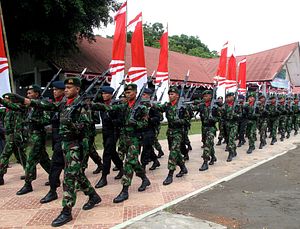On January 18, Indonesian President Joko “Jokowi” Widodo swore in Air Marshal Hadi Tjahjanto as the country’s new Air Force chief. Tjahjanto’s selection has led to speculation not just about his current role, but his ascension to the position of military chief in the near future.
Tjahjanto, 53, served previously as the Indonesian Defense Ministry’s inspector-general. Prior to that, he also served as military secretary, the National Search and Rescue Agency’s director for operations and training, spokesman for the Air Force, and the commander of an airport in Malang, East Java.
Tjahjanto’s inauguration ends the search for a replacement for retiring Agus Supriatna, whose tenure was going to end on January 20. He was among three candidates proposed to Jokowi by Indonesia’s military chief, Gatot Nurmantyo. The others were deputy governor of the National Resilience Institute Air Marshal Bagus Puruhito and the deputy Air Force chief of staff, Air Marshal Hadiyan Smintaatmadja.
Tjahjanto’s appointment has also triggered speculation about whether and when he will replace Nurmantyo as Indonesia’s military chief. Nurmantyo, who is no stranger to controversy, was embroiled in a recent military spat between Australia and Indonesia and had officially been set to retire next year (See: “Old Shadows in New Australia-Indonesia Military Spat”).
Tjahjanto has risen within the military ranks quite quickly in recent years and is said to be Jokowi’s preferred candidate to replace Nurmantyo. Now that he has been selected as air force chief, his ascension to military chief would be in line with tradition. As I pointed out in an earlier piece, since 1999, the Indonesian military chief position has rotated between the Army, Navy, and Air Force in a move to reverse the traditionally dominant role of the army (See: “What Does Indonesia’s New Military Chief Pick Mean?”).
If Jokowi elects to continue on with established practice, the Air Force chief would be next in line, since Nurmantyo is an Army man. That said, as I noted before, Jokowi has already departed from this established practice by electing Nurmantyo to the post, since he replaced Moeldoko who was also from the Army.
Apart from his potential ascension to military chief, what Tjahjanto chooses to prioritize during his time as Air Force chief will be interesting to watch. Following his inauguration, he did offer some insights into some of his areas of focus would be. Unsurprisingly, one of them will be safety. A series of military incidents in Indonesia have raised questions about both the state of equipment and the decisions governing their purchase and operation. Tjahjanto said he would focus initially on having a transparent purchasing program for weapons and other military equipment and ensure proper oversight.
He also touched on ongoing efforts to upgrade the country’s fleet, which includes replacing the F5 E/F Tiger II jet fighter following the grounding of existing jets. Several potential candidates had been considered, including the JAS39 Gripen from Sweden, the Sukhoi Su-35 from Russia, and the F-16 Block 60 Viper from the United States. Tjahjanto did not offer any further details besides saying that the Air Force was still looking for a potential replacement.
































